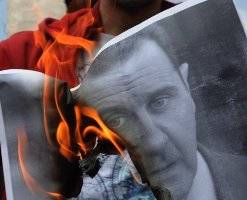In the early years of Bashar al-Assad's presidency, he was seen as a reformer, and was popular with everyday Syrians.
The slow pace of political change was often blamed on an "old guard" of aides, inherited from the era of his father, Hafez al-Assad.
But amid an uprising against his rule which has been met with brutal force and cost thousands of lives, many analysts now dismiss claims that anyone other than Assad are pulling the strings.
"We've been hearing that [others were in charge] for 11 years. But who would that be?" asks Andrew Tabler, a fellow at the Washington Institute for Near East Policy, who previously worked as a journalist in Syria.
"All of the old guard retired at the Baath party conference in 2005, and after that, Bashar consolidated his rule. Bashar and the Assad family make the decisions."
In a December interview, Assad famously said, the security forces, accused of killings and brutality, "are not my forces".
"I don't own them. I am president. I don't own the country, so they are not my forces," he told US broadcaster ABC.
But the president is the commander-in-chief, and Bassam Imadi, former Syrian ambassador to Sweden and now a member of the opposition, said: "Assad is in full control, because he has the final word.
"It has been evident from people who met the president that he himself is ordering the security forces to end this uprising by all means. It is impossible to think that he is not fully behind the atrocities taking place in Syria."
'Syrian paranoia'
Assad's brother Maher, who commands key government forces, has become something of a scapegoat among the public for the violence against protesters. But some observers say Damascus has deliberately let Maher be portrayed as a hardliner in the regime - to protect the image of the president.
Nabel al-Samman, the director of the Centre for Documentation and Research in Damascus, a private institute in the field of economics and politics, says, Assad could put an end to the crackdown if he wanted to.
"He has the decision-making [powers] to stop the military campaign," he said. "This would probably end everything in Syria in terms of violence, because violence breeds violence, and violence started when the military campaign started."
However, David Lesch, a Trinity University professor who wrote a biography on Assad in 2005, said that, while Bashar was "certainly in control and ultimately responsible for all actions by the government", he has "dangerously accorded the mukhabarat [intelligence] too much leeway and autonomy in carrying out their prescriptive actions against dissent against the regime.
"He believed that in a dangerous neighborhood, it was an unfortunate necessity in order to stay in power and secure domestic stability against perceived pernicious forces who were constantly trying to undermine the regime and the country, a characteristic Syrian paranoia."
Army loyal
Unlike in Tunisia and Egypt, where popular uprisings toppled longtime rulers Zine El Abidine Ben Ali and Hosni Mubarak, the Syrian army has stayed largely loyal to Assad. The number of soldiers defecting to the opposition appears to be increasing, but so far, mostly low-ranking officers and conscripts have turned their weapons against their former comrades.
The loyalty of the security apparatus has been attributed to the fact that the top positions in the army and intelligence agencies have almost exclusively been filled by members of the Alawite minority, a Shia offshoot to which the Assad family belongs.
Joshua Landis, the director of the Centre for Middle East Studies at the University of Oklahoma, says it is unlikely that a coup would be the resolution to the ongoing unrest "for the simple reason that the Alawite community and the military hierarchy have their backs to the wall".
"There are no good options for them and they're going to face a very bleak future when this revolution is successful," he said.
Landis says the security apparatus has been built on a system of "coup proofing" after many coups and attempted coups were carried out during Syria's first 20 years of independence.
"You don't have one person in control of enough army units to carry out a coup," he said.
"To bring stability, the rule was divided. That meant making multiple security forces, multiple military branches - multiplying centers of authority and playing them out against each other.
"Within the military, you have often a Sunni officer - the chief of staff has always been Sunni - but they're not ultimately holding the keys to power because they have to report to the Baath party commissars who are in every unit and brigade.
"It makes the army very inefficient, and incapable in offences and maneuvers, but it makes it extremely efficient in protecting the regime."
PHOTO CAPTION
A protester burns a portrait of Syrian President Bashar al-Assad during a demonstration in Istanbul.
Source: Aljazeera.com


 Home
Home Discover Islam
Discover Islam Quran Recitations
Quran Recitations Lectures
Lectures
 Fatwa
Fatwa Articles
Articles Fiqh
Fiqh E-Books
E-Books Boys & Girls
Boys & Girls  Ramadan
Ramadan Fatwa Audios
Fatwa Audios Month of Mercy
Month of Mercy Women
Women Eed Al- Fitr
Eed Al- Fitr Food Recipes
Food Recipes Videos
Videos

 Prayer Times
Prayer Times












